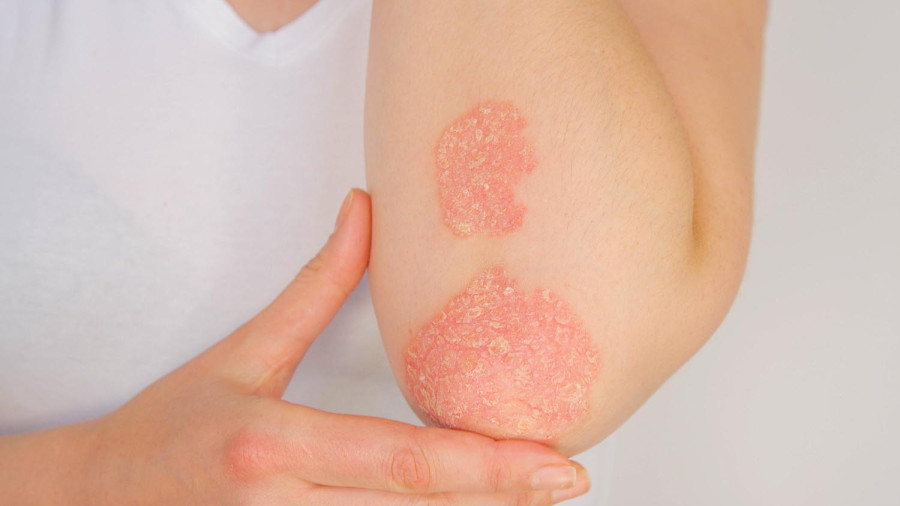Culture & Lifestyle
Managing psoriasis
Dr Isha Poudel Koirala explains the causes, symptoms, types and effective management strategies of the skin condition.
Rukusha Giri
Psoriasis is a common autoimmune skin condition that causes the skin cells to reproduce rapidly, leading to raised, red, and often itchy patches or plaques. The severity of psoriasis varies, with some experiencing mild symptoms and others dealing with a more severe form.
Dr Isha Poudel Koirala, a graduate of the Institute of Dermatology in Bangkok, Thailand, has spent eight years as a consultant dermatologist at the Kathmandu Clinic Of Cosmetic Surgery. Recently, she also established her clinic, Aesthetic Aura Skin and Hair Clinic, in Sankhamul, Kathmandu. Here, she discusses psoriasis as a skin disorder.
What is psoriasis?
Psoriasis is an autoimmune skin disease with a chronic nature that affects many worldwide. The condition is characterised by a rapid increase in skin cells, leading to thick, red and scaly patches on the skin surface. Although the disease mainly appears on the skin, it can also affect a person's general health and quality of life. Despite extensive research, the exact cause of psoriasis remains unknown. However, it is believed to arise genetically, and due to issues with the immune system and environmental factors.

It has been established that genetics plays a significant role in the development of psoriasis. Individuals with at least one family member who suffers from the condition are likely to inherit it. This familial pattern indicates a hereditary predisposition, with specific gene variations associated with a higher likelihood of developing the illness.
Additionally, psoriasis is an autoimmune disease in which the body’s immune system wrongly targets healthy skin cells, leading to rapid proliferation. This immune system dysfunction is a fundamental characteristic of psoriasis. Environmental factors such as infections (including streptococcal throat infections), skin injuries, stress, smoking and other triggers can exacerbate or initiate psoriasis flare-ups.
What are its symptoms?
Symptoms of psoriasis can depend on its various types, and its symptoms can manifest on various body parts, including the scalp, lower back, elbows and knees. The severity of the symptoms varies from person to person. Common symptoms include the presence of silvery scales covering red skin patches, dry, cracked skin that bleeds, stinging, burning or pain, and enlarged, pitted or ridged nails. It is important to note that these symptoms can cause significant discomfort and negatively impact the quality of life of those affected by the condition.
There are different types of psoriasis, but the common symptom among all types is raised red patches of skin covered with thick, silvery scales. These patches can appear anywhere on the body but are often found on the elbows, knees, scalp, lower back and genitals. There can also be itching and discomfort.
Sometimes, the condition can lead to psoriatic arthritis, causing joint pain, stiffness and swelling. Psoriasis can also affect the nails, causing pitting, discolouration and thickening.
What are the types of psoriasis?
The most common type of psoriasis is plaque psoriasis, which is characterised by raised red patches covered with silvery-white scales. Guttate psoriasis appears as small, dot-like lesions and is often triggered by bacterial infections. Inverse psoriasis occurs in skin folds and appears as smooth, red lesions. Pustular psoriasis is characterised by white pustules surrounded by red skin.
Can it be treated?
Psoriasis is a chronic condition that lacks a cure but can be effectively managed through various treatment methods. Dermatologists primarily prescribe topical treatments such as creams, ointments and shampoos containing corticosteroids, retinoids or coal tar. These treatments can help reduce inflammation and scale formation. Phototherapy is also a mild treatment option that controls exposure to UV light, which can help slow skin cell growth and reduce symptoms. In severe cases, oral medications like methotrexate or cyclosporine may be prescribed to suppress the immune response. Lifestyle modifications like avoiding triggers, moisturising skin, taking warm (not hot) baths and managing stress can also significantly help manage psoriasis symptoms.
However, it’s not just a skin condition; it can also have a profound impact on a person’s mental health. Many individuals with psoriasis suffer from negative emotions, including self-consciousness, embarrassment, and depression. Thus, it’s vital to address both the physical and emotional aspects of the condition through proper treatment and support. If you suspect you have psoriasis or have already been diagnosed with it, it’s crucial to work closely with a dermatologist or healthcare provider to develop a personalised treatment plan tailored to your specific needs and symptoms.




 14.12°C Kathmandu
14.12°C Kathmandu















